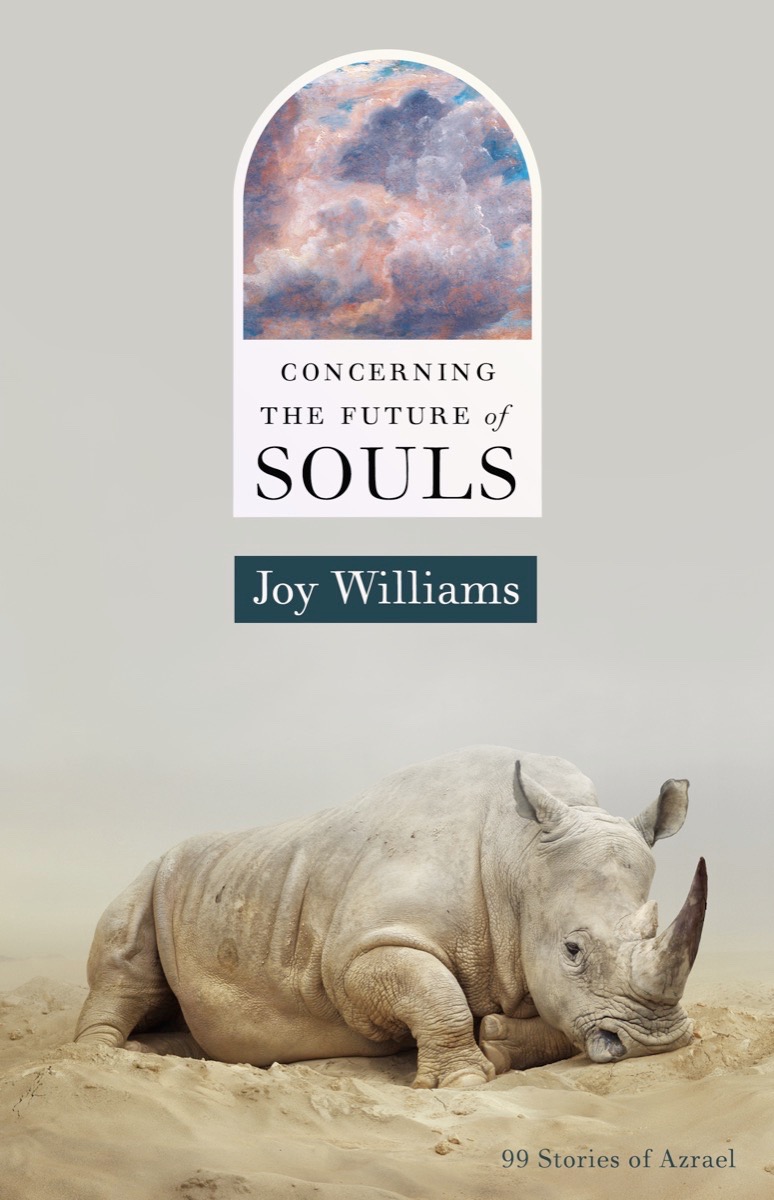 The angel Azrael has a problem. After millennia of shepherding souls, something is changing. He can’t seem to find destinations for all the souls he gathers anymore. The world is shrinking. His many eyes are growing heavy. Some are closing altogether. And his friend the Devil is too bored to care.
The angel Azrael has a problem. After millennia of shepherding souls, something is changing. He can’t seem to find destinations for all the souls he gathers anymore. The world is shrinking. His many eyes are growing heavy. Some are closing altogether. And his friend the Devil is too bored to care.
In Concerning the Future of Souls, Joy Williams provides ninety-nine snapshot-like stories filled with grief, longing, humor, and curiosity, exploring ideas of faith and humanity in the modern world. Described as illuminations, these compact stories explore a wide range of places and people. Some involve well-known figures and others focus on the most ordinary of individuals. There’s an abundance of animals, as well, perhaps enough to fill Noah’s Ark. And as the collection builds, it becomes clear that the destruction of the natural world is a central concern here.
This destruction particularly troubles Azrael, who along with the Devil are the only recurring characters in the collection. Their interactions, juxtaposing the devil’s studied indifference to humanity with Azrael’s sympathy for it as the transporter of souls, form the backbone of the collection. There’s a deep sense of unhappiness imbedded in each character. Williams manages to make the Devil feel like the disaffected CEO of a Silicon Valley start-up, tired of everything he has and cynical about anything in the future, writing, “The Devil had little to occupy his time which had become less and less valuable. Everything he stood for was running along on its own, requiring very little involvement on his part.” While Azrael feels like an overextended gig worker, zipping around the world thousands of times per day in a never-ending cycle of soul pickups and deliveries which leave him hollow.
With sparse, focused prose emphasizing striking physical details, Williams creates stark portraits of senselessly slaughtered dolphins, razed forests, and overrun holy sites. There is a clear warning here about the cost of damaging our environment. And it is not just a physical toll. As once solemn traditions lose their meaning and places of reverence are turned into tourist traps, it becomes obvious that failing to respect what we find in the world may be costing us a part of our humanity. Amidst this devastation a feeling emerges that it is the soul of the earth itself that is in danger of evaporating completely and that Azrael feels woefully ill-equipped to save it. And the question lingers in his mind if it is even right for him to do so. Is there not a divine plan at work here?
God seems frustratingly distant, both in the celestial stories and in the stories of regular people. It is made clear from the very beginning that Azrael is distinct from other angels. Heaven is not his realm. He and Jesus are not well aquatinted, we are told. Just as importantly, Azrael is not Death. Azrael’s purview is the living world and the souls that fill it. In this regard, he is not unlike the Devil. And this results in an oddly touching camaraderie between the two. As they snipe at each other, execute petty revenges, and argue philosophy it becomes clear that they rely on one another’s company to keep back a void of loneliness. It is a need for connection that feels distinctly human.
Silence doesn’t just echo from the divine in these stories, it prevails in the mundane world as well. From a father afflicted by laryngitis to a man awed into silence by the sight of two elephants, people struggle to find their voices in these stories. As with most things in this collection, there are two faces to this silence. At times it provides a sense of calm and reflection, while at others it becomes a fearsome, devouring force. It is the silent drip of grains through the hourglass, as the feeling builds from one story to the next that time is running swiftly out—for the world and for the souls trying to find their way back to it.
The mixing of the celestial and the mundane in these stories makes the smallest moment feel significant, while the weightier concerns of the Devil and Azrael take on a degree of irreverence. Illustrious figures such as Bach and Dylan Thomas often appear hapless or absurd, while anonymous characters carry themselves with a humble dignity. These stories sometimes feel like bizarre fever dreams, others arrive with startling clarity. The result is a strangely beautiful kaleidoscope, refracting the question of what it means to be human into ninety-nine bejeweled rays.
Publisher: Tin House
Publication date: July 2, 2024
Reviewed by B.B. Garin.
B. B. Garin is a writer living in Buffalo, NY. Her story collection, New Songs for Old Radios, is available from Wordrunner Press. She is a recipient of the Sara Patton Fiction Stipend from The Writer’s Hotel. Her work has appeared inThe Hawai’i Pacific Review, Luna Station Quarterly, Palooka, 3rd Wednesday, Crack the Spine, and more. Connect with her @bb_garin or bbgarin.wordpress.com.
